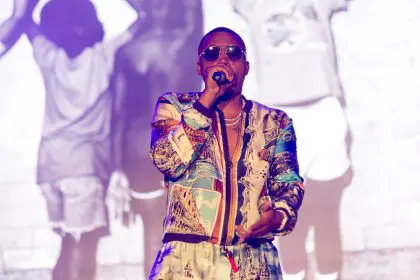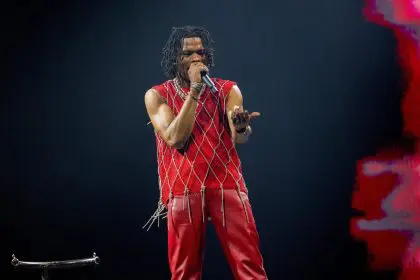
Australian rapper Iggy Azalea had something of a coming-out party at last night’s 2014 Billboard Music Awards. Opening the show by performing her hit “Fancy,” as well as handing an assist to songstress Ariana Grande during a rendition of their hit collaboration “Problems,” it was an important moment for the female rapper from Down Under with the faux-Dirty South accent and part-time modeling career. “Fancy” which also features Charli XCX, currently sits at No. 3 on the Hot 100. And “Problems” is at No. 4.
For those keeping score, that means Azalea is the first female rapper ever to have two songs concurrently in the top five of the Hot 100 chart.
One has to wonder what that means for female rappers. Is it a breakthrough moment for lady microphone fiends everywhere or just a moment for Iggy Azalea? This isn’t her first “first,” either — in 2012, she became the first female rapper to be featured on XXL’s much-ballyhooed “Freshman Class” cover. This year, there were no women represented.
Azalea’s high-profile success has brought the age-old controversy that surrounds white artists performing black music back to the fore. But unlike white male rappers like Macklemore, Iggy Azalea isn’t just a white face in a sea of well-known (sometimes even better-known) black faces. Aside from Nicki Minaj, female rappers are the least visible that they’ve ever been in the genre’s history. The lack of notable women in hip-hop became so obvious that the Grammy’s suspended its “Best Female Rap” category almost a decade ago and in the years since only one female rapper —Young Money superstar Nicki Minaj —has been a consistent presence on the charts. Right now, Azalea is the biggest female rapper in hip-hop under 30 years old.
And Azalea’s own controversies shouldn’t be glossed over.
Last summer, she was forced to respond to criticism after earlier racist tweets made by her were brought to public attention. In the tweets, she made jokes about Mexican women’s bodies, black men being arrested outside of Popeye’s chicken restaurants and also made derogatory comments about lesbians. Some would argue that these were just misguided and tasteless jokes made by a girl barely out of her teens; but another female rapper, Harlem-born Azealia Banks, became notorious for posting inflammatory tweets and was generally criticized by media and fans, to the point where she was branded a provocateur and even a racist and a homophobe. Banks is a year younger than Azalea but her snarky Twitter posts weren’t dismissed as simply immature or trivial. She can’t just be a smart-mouthed kid like Iggy?
How did Iggy respond to the controversy regarding her tweets? By chastising people for holding her accountable for them. “Listen. I see a trend on Twitter in the last week that involves ppl retweeting artists old tweets. I’m talking OLD, done and dusted ass ones.” She also lamented not being able to tweet whatever she wants because “you guys would make life a nightmare” and it would be “unprofessional.”
The 2012 Twitter-feud between Iggy Azalea and Azealia Banks centered on Banks’ belief that Iggy didn’t deserve to be included on XXL’s Freshman cover that year, but it also had to do with Iggy’s reckless and tacky rhyme from her song “D.R.U.G.S:” “When the relay starts I’m a runaway slave … Master, s–tting on the past gotta sp-t it like a pastor.” Iggy later described the line as “a metaphoric take on an originally literal lyric” from Kendrick Lamar’s “Look Out For Detox.”
Meanwhile, Banks has yet to release her debut album and has been vocal in her frustrations with her record label. The album, Broke With Expensive Taste, is expected to be released sometime in the summer of 2014. Angel Haze, who was featured on XXL’s 2013 Freshman Class cover, released her debut album Dirty Gold in late 2013. It failed to crack the Billboard 200. North Carolina-born emcee Rapsody had one of the most acclaimed indie rap albums of 2012 with The Idea of Beautiful, but she failed to make much of a commercial impact and also wasn’t featured on an XXL Freshman Class cover.
So what does Iggy Azalea’s success mean for black women in hip-hop? Does it keep them invisible?
Even at the Billboard Awards, the only black performer other than a hokey CGI hologram of Michael Jackson was John Legend. The award winners were also pretty monochromatic: The winner of Top Rap Artist? Eminem. Top Rap Song? “Can’t Hold Us” by Macklemore. Top R&B Song? “Blurred Lines” by Robin Thicke. The Billboard Awards are largely based on chart success. That says a lot about who’s buying and who’s selling.
Azalea’s success doesn’t seem to be an indicator of a swing in commercial success for female rappers who happen to be black and not named “Nicki Minaj.” In watching her Gwen Stefani-channeling rap-cheerleader performance at the Billboard Music Awards, one couldn’t help but wonder if we were watching an anomaly —the latest in a long line of novelty rap superstars —or a harbinger of things to come.














